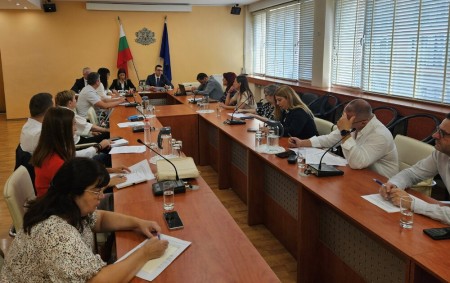Ministry of Economy and Business Discusses Guidelines on the Proper Implementation of Dual Price Display for Goods and Services
Prices must be displayed clearly and legibly in both currencies, using the same font size and with labels that are easy for consumers to understand. This was stated by the Minister of Economy and Industry, Peter Dilov, following a meeting of the “Non-Financial Sector” expert working group of the Coordination Council for Bulgaria’s Preparation for Membership of the Euro Area. The meeting, held at the Ministry of Economy and Industry, was attended by Deputy Minister Nevena Lazarova, along with business representatives and experts from industry associations and non-governmental organisations.
At the meeting of the Non-Financial Sector expert working group, guidelines were discussed on the application of the obligation for traders to display the prices of goods and services in both currencies, and on the payment of purchases in cash in euro and leva, in connection with the introduction of the euro in the Republic of Bulgaria.
Minister Dilov emphasised that the guidelines are intended to provide methodological instructions and maximum clarification on the implementation of the obligation for traders to display the prices of goods and services in both currencies, as well as on cash payments in euro and leva.
According to him, they cover the period of dual price display from 8 August 2025 to 8 August 2026. “The guidelines are not legally binding, but they are important for businesses and for the observance of good practices,” he stressed.
Dilov underlined that the guidelines were drawn up within the working group, in line with proposals from employers’ organisations and in accordance with the requirements and latest amendments to the Law on the Introduction of the Euro in the Republic of Bulgaria.
They include clarifications on the display of prices during the dual-pricing period. “Prices in leva and euro must be placed side by side, written clearly and legibly, in the same font size, style and colour. The currency of the respective price must also be written in the same font size, style and colour,” he stated categorically. There is no requirement as to which currency should be listed first. If the decimal digits in one currency are written in a smaller font, the same may be applied to the other currency, the Minister explained.
From 1 January 2026, the law will not prohibit mixed payments, but traders will have the discretion to decide whether to accept them. For cash payments, change must be returned entirely in euro; however, if this is not possible, it must be returned entirely in leva. The same rule applies to refunds.
After discussions with business representatives, industry experts and non-governmental organisations, the guidelines will also be published on the official government website Evroto.bg
The Minister of Economy stressed that Bulgaria’s accession to the eurozone will have a positive impact on the economy and on business, and will undoubtedly raise people’s standard of living.
Dilov was categorical that, in addition to being ready for accession to the eurozone, the business community is fully aware of the benefits. From 1 January 2026, the costs of currency conversion and of maintaining both leva and euro accounts will be eliminated, resulting in savings which, according to ministry data, will amount to approximately BGN 1.1 billion.
He added that even before formal accession, the first positive effects are already visible. “Bulgaria’s credit rating has been upgraded by one notch, reaching for the first time the levels of 2007. We expect it to be upgraded by another notch by the end of this year or the beginning of next, which would mark the highest credit rating in Bulgaria’s history,” he said.
The Minister of Economy also highlighted the increase in investor interest, noting that foreign direct investment rose by 47% to EUR 1.4 billion in the first five months of the year.
